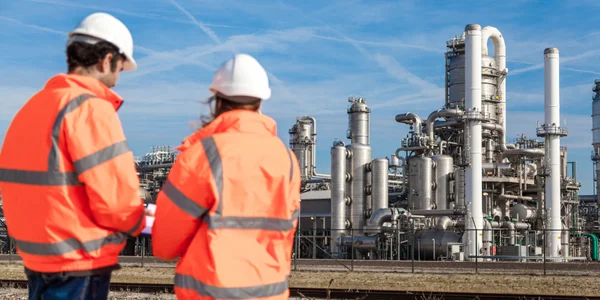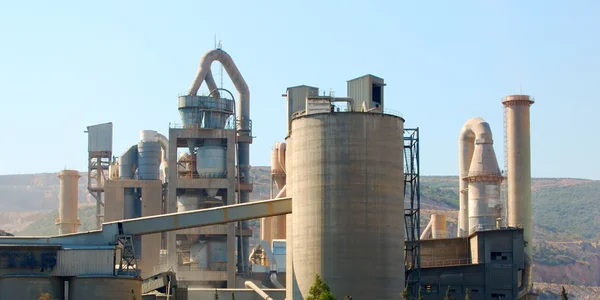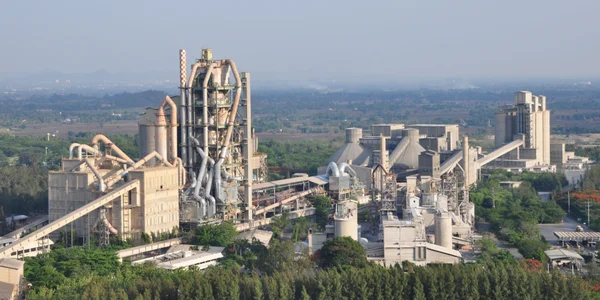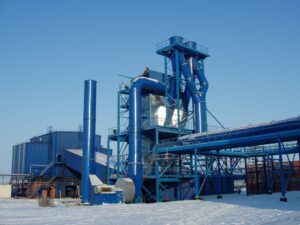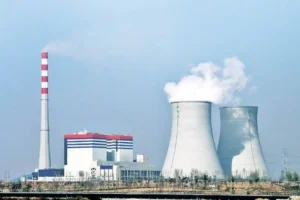Hybrid Filters
- Electrostatic Precipitators
- Reverse Air Bag Houses
- Fabric filters
- Hybrid electro filters
- Flue Gas Desulphurization
- Forced draught cooler
- Scrubbers
- Gas cleaning plants
- Cyclones
- Multiclones
- VOC + Odour removal system
- Dust extraction system
- Fumes extraction system
- Explosion protection devices
- Fans and blowers
- Waste water treatment
- Air to Air Heat Exchanger
Offices
HEADQUARTER

Germany
-
Intensiv Filter Himenviro Technologies GmbH
Neustraße 45 - 49, 42553, Velbert, Deutschland/Germany - +49 20534200990
REGIONAL OFFICE

Great Britain
-
Intensiv Filter Himenviro UK Limited
47, Bath Street WS13BX, Wallsall West Midlands, Great Britain - +44 1922 628893
REGIONAL OFFICE

United Arab Emirates
-
Intensive Filter Himenviro Technologies FZE – LLC
Business Centre, Sharjah Publishing City Free Zone, Sharjah, UAE - +971-556074697
REGIONAL OFFICE

India
-
Intensiv-Filter Himenviro Private Limited
D-247/11, Sector-63, Noida - 201301, Uttar Pradesh, India - +91-120-4642-500
REGIONAL OFFICE




India
-
Intensiv-Filter Himenviro Private Limited
D-247/11, Sector-63, Noida - 201301, Uttar Pradesh, India - +91-120-4642-500
REGIONAL OFFICE




India
-
Intensiv-Filter Himenviro Private Limited
D-247/11, Sector-63, Noida - 201301, Uttar Pradesh, India - +91-120-4642-500
Hybrid Electro Filters
Our, ‘Electro-Plus-Hybrid Filter’ technology, is a solution provider, using a filtering system using static electricity on the particulate matter, for higher collection efficiency with less pressure drop. It solves the pressure drop increase problem frequently observed due to bag clogging by impregnation of fine dust particles, in the case of a conventional Bag Filter System, which enhances the bag life considerably. The hybrid filter is a high-efficient and high-performance complex filter system in which the dust particles from the Dendrite Structure Layer on the bag surface prevent the penetration of microparticles and reduce the blinding status of filter bags, thereby enhancing the filtering efficiency of the hybrid system. The hybrid filter is a high-efficient and high-performance complex filter system in which the dust particles from the Dendrite Structure Layer on the bag surface prevent the penetration of microparticles and reduce the blinding status of filter bags, thereby enhancing the filtering efficiency of the hybrid system.
Application


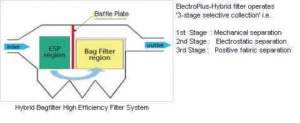



Process
Our Services
Case Study
Frequently Asked Questions
1. What is a hybrid filter?
A hybrid filter is a device that cleans dirty air by combining two methods: electrostatic precipitation and fabric filtration. First, it uses electrical charges to capture large dust particles. Then, it uses fabric filters to catch smaller particles, making the air cleaner and safer to breathe.
2. How does a hybrid filter work?
A hybrid filter works in two steps. First, the electrostatic section charges and captures large dust particles from the air. Next, the air passes through fabric filters that trap the remaining fine particles. This two-step process ensures efficient removal of dust and pollutants from the air.
3. Why are hybrid filters used in industries?
Industries use hybrid filters to keep the air clean by removing dust and harmful particles produced during manufacturing. This helps protect workers’ health, reduces environmental pollution, and ensures compliance with air quality regulations.
4. What are the benefits of using a hybrid filter?
Hybrid filters offer several benefits:
- High Efficiency: They effectively remove both large and small particles from the air.
- Energy Savings: The combination of technologies reduces energy consumption compared to using separate systems.
- Cost-Effective: They often require less maintenance and have longer lifespans, saving money over time.
5. In which industries are hybrid filters commonly used?
Hybrid filters are commonly used in industries such as:
- Cement Production: To control dust emissions.
- Power Plants: To remove fly ash from flue gases.
- Steel Manufacturing: To capture metallic dust particles.
- Chemical Processing: To filter out hazardous airborne particles.
6. How does a hybrid filter compare to traditional filters?
Unlike traditional filters that use only one method, hybrid filters combine electrostatic and fabric filtration techniques. This combination allows them to capture a wider range of particle sizes more efficiently, leading to cleaner air and improved performance in industrial applications.
7. What maintenance is required for hybrid filters?
Maintaining a hybrid filter involves regular inspections to check for wear and tear, cleaning or replacing fabric filter bags as needed, and ensuring the electrostatic components are functioning properly. Following the manufacturer’s maintenance guidelines helps keep the system effective and extends its lifespan.
8. Can existing filtration systems be upgraded to hybrid filters?
Yes, many existing filtration systems, especially electrostatic precipitators, can be upgraded to hybrid filters. This upgrade enhances filtration efficiency without the need for completely new installations, making it a cost-effective solution for industries aiming to improve air quality.
9. Are hybrid filters environmentally friendly?
Hybrid filters are environmentally friendly because they effectively reduce the emission of harmful particles into the atmosphere. By capturing a broad range of pollutants, they help industries meet environmental regulations and contribute to cleaner air.
10. How do hybrid filters contribute to energy efficiency?
Hybrid filters contribute to energy efficiency by combining two filtration methods that work together to reduce the overall energy required for air cleaning. The initial electrostatic stage captures large particles with minimal energy, reducing the load on the subsequent fabric filter stage, which in turn operates more efficiently.

